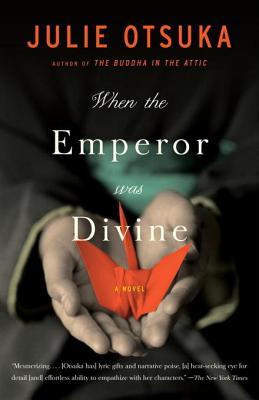Nataliya's Reviews > When the Emperor Was Divine
When the Emperor Was Divine
by


It's a wonderful book.
by

“But we never stopped believing that somewhere out there, in some stranger’s backyard, our mother’s rosebush was blossoming madly, wildly, pressing one perfect red flower after another out into the late afternoon light.”It's easy to make a story like this melodramatic, moralistic, overwrought with feelings. A less skilled writer would have done it. A story of an unnamed Japanese-American family banished from their quiet life in Berkeley to spend over three years in an internment camp for a simple "crime" of being Japanese in the US during World War II is, after all, a story that comes with built-in pathos and anger - a collision of emotions that in the right hands can deliver a perfect punch.
“Keep your head down and don’t cause any trouble, we’d been told, weeks before, in a mess hall lecture on “How to Behave in the Outside World.” Speak only English. Do not walk down the street in groups of more than three, or gather in restaurants in groups of more than five. Do not draw attention to yourselves in any way.”But Julie Otsuka does not take the easy and obvious path. She stays away from the obvious heartstrings-tugging a lesser writer could have settled for. Instead, she delivers a subtle but remarkably powerful story; a crisp and precise and yet muted and subdued, understated and somewhat detached narrative with nevertheless a documentary camera lens-like clarity. She does not tell but shows, letting us experience and make our own conclusions through the eyes of the family members - the mother, the girl, the boy, then the combined "we" of the children's perspectives, finally ending on the shortest and the most charged viewpoint of the father. The tragedy of the casual crime of the country against some of its citizens carries a heavy weight. But still, the conclusions are left to be your own.

“They had all seen us leave, at the beginning of the war, had peered out through their curtains as we walked down the street with our enormous overstuffed suitcases. But none of them came out, that morning, to wish us goodbye, or good luck, or ask us where it was we were going (we didn’t know). None of them waved.”The powerful parts for me were not the internment chapters but the return - back to the 'normal' world, into the lives forcibly left behind years ago, without an acknowledgement of the wrongness done but instead with a measly payout equal to those released criminals get, expected to act like nothing had happened but to cautiously "behave", accept the injustice as necessity and move on, blend in, not make any waves, pretending that they don't know who used to own the bits of life pilfered by your own neighbors. And eventually you may learn to accept the belief that somehow you must have been at fault - otherwise how can it all make sense?
“We looked at ourselves in the mirror and did not like what we saw: black hair, yellow skin, slanted eyes. The cruel face of the enemy.It's a short book, and every page in it is essential; there's no filler, only the bits that are necessary to build the intricate picture of the events that should provoke anger but - since there's little choice for those swept away by them - have to be met with resignation and attempts to preserve dignity while inevitably stripping away the bits of self that are found to be inconvenient for those wielding power.
We were guilty.”
It's a wonderful book.
“So go ahead and lock me up. Take my children. Take my wife. Freeze my assets. Seize my crops. Search my office. Ransack my house. Cancel my insurance. Auction off my business. Hand over my lease. Assign me a number. Inform me of my crime. Too short, too dark, too ugly, too proud. Put it down in writing—is nervous in conversation, always laughs loudly at the wrong time, never laughs at all—and I’ll sign on the dotted line. Is treacherous and cunning, is ruthless, is cruel. And if they ask you someday what it was I most wanted to say, please tell them, if you would, it was this:
I’m sorry.
There. That’s it. I’ve said it. Now can I go?”
Sign into Goodreads to see if any of your friends have read
When the Emperor Was Divine.
Sign In »
Reading Progress
Started Reading
February 18, 2015
–
Finished Reading
February 19, 2015
– Shelved
Comments Showing 1-8 of 8 (8 new)
date newest »
newest »
 newest »
newest »
message 1:
by
s.penkevich
(new)
Feb 22, 2015 08:36PM
 Wonderful review!
Wonderful review!
reply
|
flag
 Caro wrote: "Have you read Buddha in the Attic? I dare say you'd enjoy it as much, if you haven't already. :)"
Caro wrote: "Have you read Buddha in the Attic? I dare say you'd enjoy it as much, if you haven't already. :)"I read it about a year ago and loved it. https://www.goodreads.com/review/show.... So far Julie Otsuka's writing has been perfect for me.
Ivonne wrote: "Beautiful review. I must read this beautiful book."
Thanks!
 Infamy by Richard Reeves is a riveting account that takes exposes the racist politicians who were the interment like Earl Warren and FDR. Also he writes about some of the hero's to help Japanese American like Ansel Adams.
Infamy by Richard Reeves is a riveting account that takes exposes the racist politicians who were the interment like Earl Warren and FDR. Also he writes about some of the hero's to help Japanese American like Ansel Adams.





